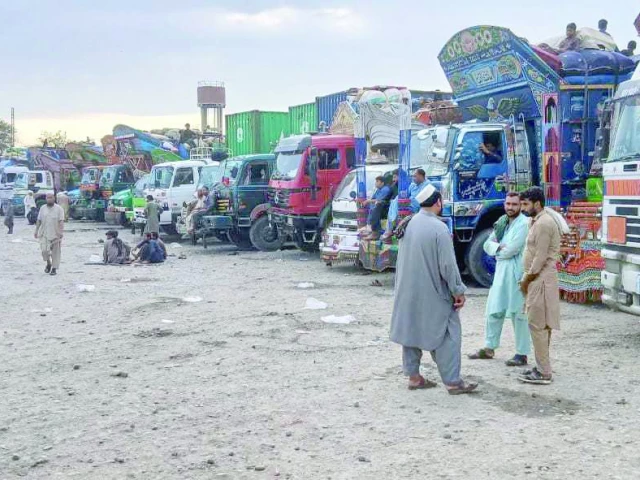Border closure halts bilateral, transit trade
Tensions freeze dealings between Pakistan, Afghanistan; thousands of trucks stranded

PESHAWAR
Ongoing border tensions between Pakistan and Afghanistan have brought all forms of bilateral and transit trade to a standstill since Sunday, October 12, causing severe economic losses on both sides and leaving thousands of trucks stranded along the main crossings.
According to security sources, the suspension followed an exchange of fire late on the night between October 11 and 12, when Afghan forces allegedly opened unprovoked fire on Pakistani border troops. Pakistani forces responded robustly, triggering heightened tensions along the entire frontier from Chitral to Balochistan. As a result, all four major trade gateways, Torkham, Kharlachi, Ghulam Khan, and Chaman, were closed indefinitely.
The closure has paralyzed cross-border trade and halted the Afghan transit trade, dealing a blow worth billions of rupees to both economies.
Fresh data from the Federal Board of Revenue (FBR) for fiscal year 202425 highlights the scale of the disruption. Annually, Pakistan imports goods worth $66.328 million from Afghanistan through the Torkham crossing and exports goods valued at $62.766 million. Through the Ghulam Khan route, imports average $80.109 million and exports $33.240 million per year. The Kharlachi crossing accounts for imports of $30.38 million and exports of $27.32 million, while trade through the Chaman gateway includes imports of $80.289 million and exports of $265.06 million annually.
Collectively, Pakistan's four main border points with Afghanistan handle average annual imports worth $566.766 million and exports totalling $1.504 billion, contributing significantly to the national exchequer. FBR data shows that bilateral trade generates an estimated Rs46.867 billion annually in customs duties alone.
Key Pakistani exports to Afghanistan include rice, cement, pharmaceuticals, medical equipment, textiles, and fresh fruits, while imports from Afghanistan consist mainly of coal, fresh and dry fruits, soapstone, vegetables, and other raw materials. The suspension of the Afghan transit trade through these same crossings has compounded the losses, with customs officials confirming that the government is losing millions of rupees in daily revenue.
President of the Khyber Chamber of Commerce and Industries, Muhammad Yousaf Afridi, emphasized in an interview that Afghanistan remains Pakistan's closest and most important market. "The closure of these trade corridors has effectively frozen industrial activity across the country," he said.




















COMMENTS
Comments are moderated and generally will be posted if they are on-topic and not abusive.
For more information, please see our Comments FAQ